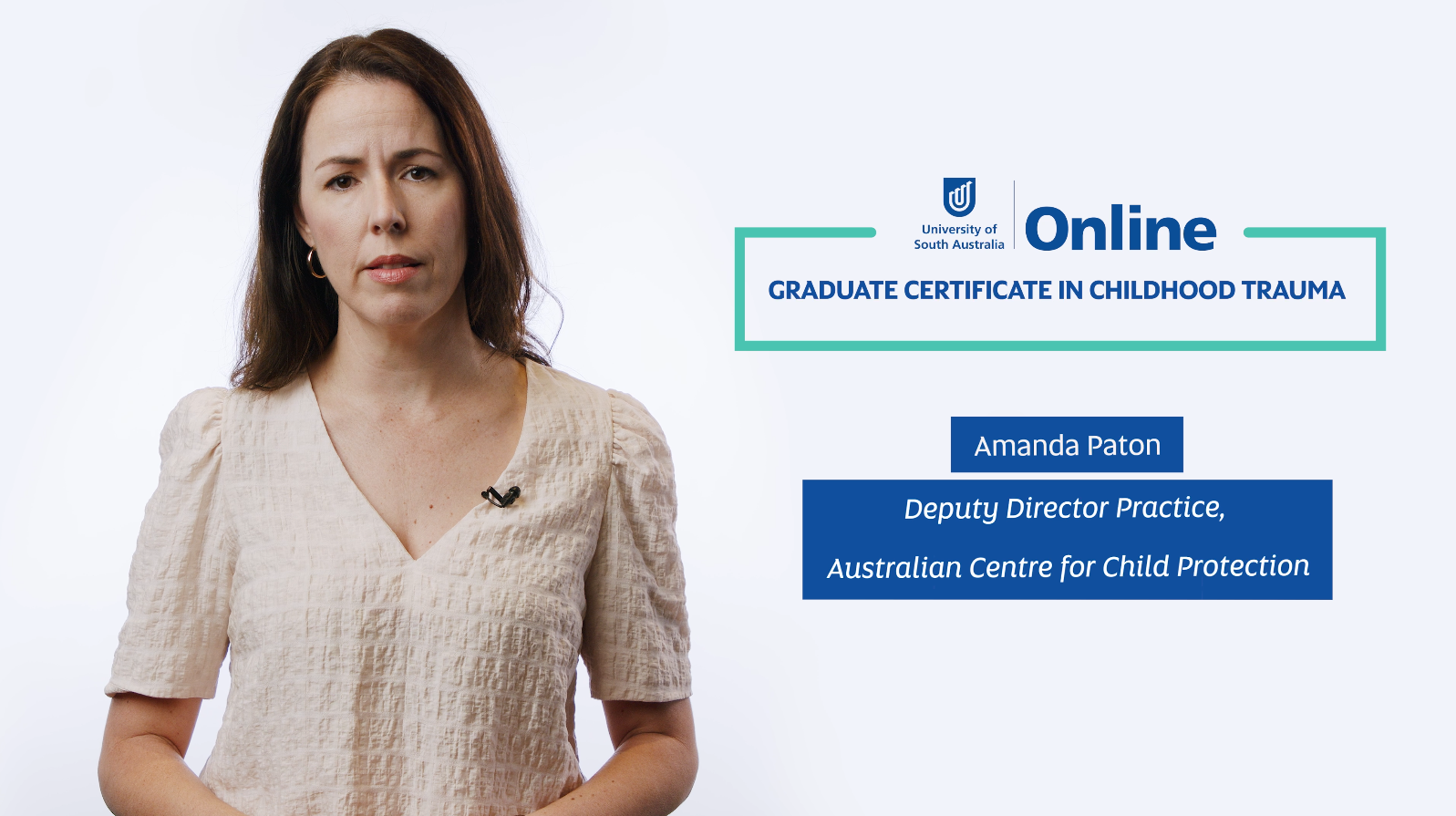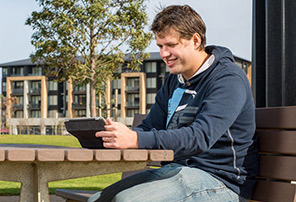You're viewing degree information for International students
You're an International student if you are:
- NOT an Australian or New Zealand citizen
- NOT an Australian Permanent Resident (including Permanent Humanitarian Visa holders)
Please remember your residency (the country you are currently in) has no impact on whether you are an Australian or International student.
UniSA Online degrees normally require international students to study outside of Australia. If you would like to study a UniSA Online degree within Australia, your visa conditions will need to allow online study. For advice on eligibility to study onshore in Australia, please contact us.
Graduate Certificate in Childhood Trauma
Degree Level Postgraduate
Year 2025
-
View full entry requirements Hide full entry requirements
Entry requirements
Applicants are required to meet one of the following criteria:
Hold an undergraduate or postgraduate qualification in education, youth work, welfare, social work, psychology, social science or related discipline,
OR
Hold an Advanced Diploma or Diploma qualification in community services, youth work, nursing, welfare, policing, criminology, or related discipline, OR completion of one of the following UniSA Professional Certificates: Professional Certificate in Understanding Childhood Trauma, Professional Certificate in Assessing Childhood Trauma, or Professional Certificate in Responding to Childhood Trauma, AND have recent significant experience (minimum two years' full-time equivalent) working in a community sector organisation or relevant equivalent, in a role involving the self-directed application of knowledge, the exercise of judgment, and decision-making responsibilities, working with children, young people and/or families
OR
Have a minimum of three years' experience working in a community sector organisation or relevant equivalent, in a role involving the self-directed application of knowledge, the exercise of judgment, and decision-making responsibilities, working with children, young people and/or families.
All applicants are required to hold a current Working with Children Check (WWCC), or a National Police Clearance (valid within 12 months) or equivalent.Applicants who do not hold a completed undergraduate or postgraduate degree or relevant completed UniSA Professional Certificate are asked to also provide a brief curriculum vitae.
English language entry requirements
In addition to meeting academic entry requirements, international students who speak English as a second or additional language must also meet the University's English language entry requirements. The minimum language requirements for this program are:English language testPlease access the following link for a comprehensive list of English language tests accepted by UniSA and other important information in relation to meeting the University’s language requirements: English Language Equivalence Table (PDF)- IELTS total [6.5]
- IELTS reading [6.0]
- IELTS writing [6.0]
Applications to study this program through UniSA Online are now closed. To commence study in this program in 2026, you will need to apply to Adelaide University. Applications open August 2025.
Degree overview
- Develop specialised knowledge of child abuse and neglect, harmful sexual behaviours, child development, and the impact of trauma on vulnerable children, their families and communities.
- Learn to apply critical thinking and reflection skills when understanding, assessing and responding to childhood trauma.
- Study a qualification informed by the Australian Centre for Child Protection’s pioneering research, which is producing new approaches to child protection policy and practice.
- Gain the skills and confidence to work across a range of therapeutic, direct care and advocacy settings.
Snapshot

Study On Demand – this is a 100% online qualification designed specifically for online learning. With UniSA Online, you can take full control over your study, access support seven days a week, plan your study to fit around your life, view learning resources 24/7, and log in to the interactive online environment anywhere, any time and on any device.
The Graduate Certificate in Childhood Trauma has been designed to meet national strategies for improving the prevention of child abuse and trauma, and offers expert knowledge of child abuse and neglect, harmful sexual behaviours, and the development and impact of trauma.
Developed by experienced practitioners and informed by contemporary research from the Australian Centre for Child Protection, you’ll graduate ready to offer effective support to children exposed to abuse and trauma.
What you'll learn

The Graduate Certificate in Childhood Trauma will provide you with specialised knowledge and a deeper understanding of how to work therapeutically with vulnerable children.
You’ll learn to better understand, recognise and respond to child trauma from abuse and neglect, exploring important topics including neurodevelopment, attachment, trauma-informed care, case planning, referral and assessment, and reflective practice.
Your studies are complemented by regular community of practice sessions, where you’ll connect with specialists and peers to work through the course content in an interactive and supportive environment. These sessions will be framed by your professional experience, and offer a way to meaningfully reflect on concepts and theoretical learning.
Learn from industry experts and develop evidence-based approaches to effectively support and care for those who have experienced complex trauma. You’ll access relevant case studies and benefit from the advanced research undertaken by the Australian Centre for Child Protection.
-
Rules & notes
Rules
Go here to the see the complete UniSA Online electives list.
1. Students who have completed the Professional Certificate in Understanding Childhood Trauma (ZPUCT), Professional Certificate in Assessing Childhood Trauma (ZPACT), and the Professional Certificate in Responding to Childhood Trauma (ZPRCT) should complete the UO Childhood Trauma Capstone course to be eligible to graduate from this program.










.jpg)